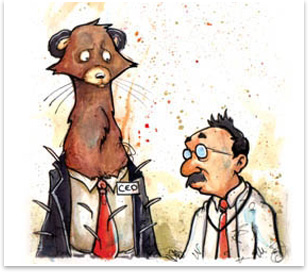
Stop Curling Up Like a Porcupine! Get Accountable!
Summary:
In some respects, people who lack accountability are a lot like porcupines—those prickly creatures that live in the wild. The porcupine defends itself by curling up in a ball and protects itself with 30,000 outwardly pointed quills. Predators cannot penetrate this defense mechanism. This typifies many employees’ attitudes and actions. So when people are not accountable, they symbolically curl up like a porcupine, leaving lots of quills on the floor of halls and meeting rooms. End the blame game now 1. Take the first step. Many people believe that accountability must start with the firm principals and trickle down. Although it certainly helps if the principals can model the appropriate behavior, the fact is that anyone—even you—can begin instilling accountability in your organization (or at least your department). Therefore, be the person who goes the extra mile. Find the answer to people’s questions, even if it really isn’t your job. Rather than complain about low numbers, pitch in and do your part to bring the numbers up. Volunteer. Join committees. Keep your appointments. Do what you say you’ll do … when you say you’ll do it. K 2. Be sensitive to others. If one of your peers approaches you and asks for an update on a project that’s going on somewhere in your department, don’t say, “I don’t know. You’ll have to ask Mary. That’s not my job.” Such an answer affects how the other person perceives you. At best, you become known as someone unreliable, uninformed, and uncaring. At worst, people believe you to be simply incompetent. Instead, see any questions from the other person’s perspective. If they’re coming to you for information, then they honestly believe you can help, so do so. Part of being sensitive to others also means being bold. Take a risk. Reach out to others. Reconnect with colleagues and customers. Solicit feedback from others. The ancient Egyptians had a saying: “Hear like a porcupine,” meaning that you need a highly acute sense of hearing. So really hear what people want, and then deliver. Don’t just wait for management to mandate something or for your boss to ask you to deliver information. Instead, take the initiative to start something on your own. When you do, others will take notice and will appreciate your actions. 3. Use accountability to differentiate. In companies that don’t play the blame game and that actually have accountability in place, you can see a true sense of differentiation. Think about it. When you need to purchase clothing or furniture, you know there are many different stores to choose from. And while price is often a factor for consideration, you likely choose to patronize the store that offers a certain level of customer service that you expect. If it’s a small purchase, like a T-shirt and some shorts, then any store may do. But if it’s a large purchase, such as a wedding gown or a business suit, then you’ll likely choose the store where you feel a sense of accountability among the employees. In many firms, the executives sit in the boardroom for days trying to figure out how to differentiate their products. After all, a shirt is a shirt, and a phone is a phone. Often, what really makes the difference to customers are the employees. So suppose you have 500 employees on the payroll. You already are paying these people. You likely don’t need to increase your ad budget if you can make a difference with your employees. That is, you need to train them to be responsive not just to you, but to your customers, to your organization, and to your distributors. That can be your difference right there. As they say, “People make the company.” Yes, it’s a cliché, but it’s true. Tame the Beast Within |
||
Copyright 2007 The American Institute of Architects. All rights reserved. Home Page |
||
Roger Hall, founding partner of Porcupine Communications, has more than 30 years of experience in marketing and communications to help companies improve their bottom line with effective leadership. For information on his services and upcoming book, How Do You Pet a Porcupine? Solutions to Prickly Communications Problems, visit the Porcupine Communications Web site.

 by Roger Hall
by Roger Hall Porcupine behavior
Porcupine behavior eep your actions visible so others see the behavior you’re modeling. Help people understand that being accountable is not a bad thing—that it’s simply part of being a team. Make sure others see that you’re not just focusing on self-preservation and that you’re looking out for the best interests of the entire department or firm. Yes, this will require you to step out of your comfort zone and work a little harder. However, as your actions begin to rub off on others, you’ll be on your way to creating an environment that fosters communication and helpfulness—two qualities of a winning organization.
eep your actions visible so others see the behavior you’re modeling. Help people understand that being accountable is not a bad thing—that it’s simply part of being a team. Make sure others see that you’re not just focusing on self-preservation and that you’re looking out for the best interests of the entire department or firm. Yes, this will require you to step out of your comfort zone and work a little harder. However, as your actions begin to rub off on others, you’ll be on your way to creating an environment that fosters communication and helpfulness—two qualities of a winning organization.